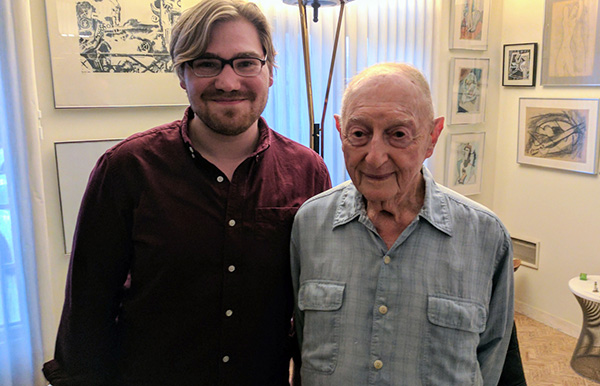

  |
|
|
||||||||||||||||||||||
|
FMS FEATURE... June 26, 2017 Composer Walter Arlen's Return to Vienna Protege Michael-Alexander Brandstetter Arranges Performance of "Song of Songs" by Jon Burlingame  Michael-Alexander Brandstetter and Walter Arlen Walter Arlen, who for three decades was a music critic for the Los Angeles Times – and as such knew virtually every composer working in Hollywood at the time – has returned to his composing roots. His "Song of Songs," a 45-minute work for chorus and orchestra based on Biblical texts, will have its European premiere Oct. 5 at the Vienna Konzerthaus. Its Vienna debut has been arranged by an Arlen protege, Michael-Alexander Brandstetter, an emerging film composer who recently graduated from the University of Southern California's film-scoring program and who is currently working as composer and music producer for Bleeding Fingers Music, a Santa Monica-based company that supplies music for television programs. Although Arlen's piece will be the focus of the Oct. 5 concert, the Schubert Fifth Symphony will also be performed, as will a short orchestral work by Brandstetter, "The Righteous Among the Nations." The concert, Brandstetter reports, will be titled "Welcome Home: Walter Arlen in Concert." Arlen, who turns 97 in July, retains vivid memories of his Jewish family being rousted by German soldiers in 1938. "They arrested thousands that night," he says in his Santa Monica home. "They were all shipped off to Dachau." His father was later sent to another concentration camp, at Buchenwald, but was eventually released. His family spent most of the war in London, where they lost three apartments during various bombings, but all survived. During that time, Arlen left Vienna in 1939 for America, where he continued music studies (notably in Chicago with Leo Sowerby) and, in the mid-1940s, became assistant and amanuensis to American composer Roy Harris. He ended up in Santa Monica, earning his master's degree at UCLA. A course in music criticism taught by L.A. Times music critic Albert Goldberg led to an invitation to join the Times staff in 1952. He spent most of the next 30 years writing music criticism, and set aside his intended career as a composer. He met many of the greats during that time, from Stravinsky to Shostakovich, often as a result of the Franz Waxman-led Los Angeles Music Festival of the 1950s and '60s (site of dozens of premieres). "Such important concerts," he recalled. "That festival was incredible." He also knew Miklos Rozsa (although he dismissed Rozsa's concert music as "third rate Bartok"), Eugene Zador ("a first class orchestrator"), Andre Previn ("a very good pianist, especially jazz"), David Raksin and others. He was among the first critics to review minimalist music (Philip Glass, Terry Riley, Steve Reich), often as part of the modernist-oriented Monday Evening Concerts. Arlen resumed composing after leaving the Times in 1982. He began "Song of Songs" in 1951, returned to the work in the 1990s and completed it as a large-scale orchestral and choral piece. The version to be performed in Vienna will feature 35 musicians, a 20-voice women's choir and soloists. "My music is nostalgic," Arlen notes, "the sadness of having to leave. The composer who formed me more than anyone else was Schubert. That's why I wrote so many songs." "What attracted me to the 'Song of Songs' was the poetry," Arlen explains, "but I found something that gave me a sense of belonging to a people whose religion is based on the Ten Commandments. It was the first example of poetry in mankind, and it's still valid today. It's the evolution from polygamy to monogamy. She sings her love for him. It's very beautiful and fresh and new." Brandstetter, who says Arlen has been like "a grandfather" to him since moving to California, says, "like Walter, some part of my Austrian heritage and culture were transplanted to Los Angeles. Especially in this day and age, when people are so insecure, it is very important to remember what happened. The young generation must make sure that this won't happen again. So it's my intention to bring Walter's music home." Arlen says his father never spoke about what happened in the concentration camps, and that he didn't ask. About his music being performed for the first time in his native Austria, he says, "I can't really put it into words. The music will speak more about it than anything I could say. It's inexpressibly wonderful." ©2017 Jon Burlingame |
Search
Past Features
|